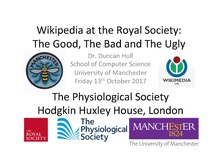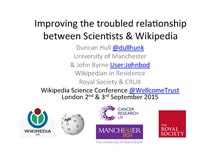Dr. Duncan Hull | |
|---|---|
 A picture of me taken by Paul Downey | |
| Nationality | United Kingdom Manchester 🐝 |
| Other names | @wikiscientists |
| Citizenship | Global 🌍 |
| Scientific career | |
| Fields | Biology Wikipedia Pedagogy Bioinformatics Computer science education[1] |
| Website | womeninred wiki-loves-scientists |
Hello, my name is Duncan, I live and work in Manchester, UK[1] and contribute to English Wikipedia, Wikidata, Wikimedia Commons and Greek Βικιπαίδεια. 🇬🇷 Why? Because it is fun and important, or as Freeman Dyson once put it:
Women in Red: Scientists and Engineers

Most of my contributions to Wikipedia are quick biographies (Wikibiographies) of living women in engineering, women in science and women in STEM fields. These biographies would otherwise be either woefully incomplete or non-existent. As part of an ongoing collaboration[4] between WomenInRed.org, the Royal Society in London and Wikimedia UK,[5][3][6][7] I have created and improved Wikibiographies of some Fellows of the Royal Society, particularly the Female Fellows of the Royal Society. I've tried to follow the fundamental wiki-principles[8][9][10] especially:
- Being bold (WP:BOLD) because most biographies are written post-mortem, and not before.[11]
- Citing reliable sources to allow verification of facts (WP:VERIFY).
- Aiming for a Neutral Point Of View (WP:NPOV) by avoiding writing biographies of people I know personally or professionally.
- Paying attention to the Biographies of living persons policy (WP:ALIVE) by sticking to verifiable facts and avoiding gossip, hearsay and libel.
- Ignoring all the rules (WP:IGNORE) everyones favourite rule, but only when it suits them.
As of January 2020[update], most fellows elected from after 2014, have reasonable Wikibiographies that usually include a good portrait.[12] If you'd like to help address the gender bias in Wikipedia which reflects everyday sexism in society at large. See the redlist index of notable women without biographies, for articles waiting to be written such as female computer scientists, female engineers and female mathematicians.
So where is your Wikibiography?


Even if you are considered notable by editors, you may not necessarily have a Wikibiography as coverage of scientists is often poor.[4][18] For example, around 30% of Fellows elected before 2012, have no wiki-biography at all.[4] Lots of notable scientists in the wider scientific community who aren't fellows have no biography either, especially women.[19][20][13][14][15] If you want a Wikibiography, there are several steps you can take to improve your chances of having one:
- Uploading a picture of you after creating an account. You can upload images using the Upload Wizard with an appropriate license. Images will often spur editors to create articles[12][21] because pictures are a key ingredient of good articles and are usually a significant improvement to an article with no picture at all, adding significant value.[22]
- Requesting a biography by adding your name to the requested biographies by profession pages. Note that demand for biographies typically outstrips supply.
- Updating information about you online to avoid the typical academic homepage of “everything you ever wanted to know about your Professor from ten years ago”.[23]
- Opening access
 to your scientific literature allows verification of facts by editors because primary sources that are open access can be more widely read and cited. If your publications are locked
to your scientific literature allows verification of facts by editors because primary sources that are open access can be more widely read and cited. If your publications are locked  behind a paywall most editors won't be able to read them as they are unlikely to have access to libraries that can afford scientific journal subscriptions.
behind a paywall most editors won't be able to read them as they are unlikely to have access to libraries that can afford scientific journal subscriptions. - Identifying yourself by clearly and persistently distinguishing your work using an Open Researcher and Contributor ID (ORCID)[24][25] in your grants and publications. Your ORCID profile can be populated automatically from the publications in your Scopus record, saving you the tedious job of re-entering all your publication data again.[26] If you haven't done so already you should also consider creating a Google Scholar profile[27] and claim your ResearcherID because they make your work more Findable, Accessible, Interoperable and Reusable (FAIR data)[17] to the wider world.[28] All this metadata will also help editors to write better articles about you.
- Communicating with the public about your work using mainstream media, social media and other platforms for public engagement that increase public awareness of science. This will create secondary sources about you and your research that add significant value to primary sources of scientific literature and enables editors (who are probably not subject experts) to understand and write about your research.
- Contributing data,[29] pictures[30] and requested articles because Wikipedia is arguably the “greatest ever opportunity for public engagement”[31] that would benefit from your expertise. As John F. Kennedy might have said:
Edits of your Wikibiography

If you do have a biography in Wikipedia it might be incomplete, inaccurate, badly written and have plenty of other “issues”. Although tempting, it is a bad idea to edit your autobiography on Wikipedia and any edits you make are likely to be speedily reverted due to your obvious conflicts of interest (COI). Getting your friends, colleagues or students to write or edit your Wikibiography is also not recommended, because it is difficult for them to have a Neutral Point of View. Leaving a comment on the the talk page of the article in question is usually the best way to make corrections and the Help Pages of the Biographies of Living Persons explain this in more detail. The notable person survival kit is also useful.
Remember that anyone can edit Wikipedia including vandals, bots, practical jokers, your students, collaborators, abusers and other enemies (assuming you have enemies). So it is a good idea to track changes of your Wikibiography by subscribing to the syndicated feed of the article using your favourite news aggregator. Point your aggregator at the atom feed which can be found on the "view history > tools > Atom" link to receive automatic notifications of edits to that page. Data from new Wikibiographies appears in the Google Knowledge Graph within a week or two of their publication, with both Wikipedia articles and the KG appearing prominently in search results, should you ever indulge in a spot of egosurfing.[4][31]
Please delete me, let me go!

If you're not feeling the Wikilove and want your Wikibiography deleted, read the how to delete a page guide and the Wikipedia:Deletion policy. You may have the right to be forgotten or may want to protect your data using the General Data Protection Regulation (GDPR). Before you request deletion from wikipedia, bear in mind that:
- Every month, Wikipedia is viewed more than 15 billion times by over 1.5 billion unique devices.[32] That amounts to over 500 million visits per day, or about 6000 visits per second.[32] To put it another way, every month, people spend ~60,000 years reading Wikipedia articles. For better or worse, Wikipedia is one of the first places the general public go to find out about science.
- According to Alexa Internet, As of 2019[update] Wikipedia is the tenth most visited website on the entire web alongside internet behemoths like the Big Four tech companies Google, Amazon, Facebook etc. It's also the seventh most visited website from the UK
- According to Crossref, in 2016 Wikipedia was the sixth largest referrer to scholarly articles via Digital Object Identifiers (DOIs), only bettered by major publishers like Elsevier, Thomson Reuters, Ex Libris Group, EBSCO Information Services and ProQuest.[33] People click on the millions of DOIs[34][35] in Wikipedia directly to the primary scientific literature.
- Consequently, having a Wikibiography is likely to increase the impact of your work inside and outside of academia. You can see your personal Wikipedia:Pageview statistics using the handy Pageviews Analysis tool.[36]
- The tax-payers, government agencies and charities who have funded your work want to maximise their investment in your research. Having it cited in Wikipedia is one small step to achieving this.
- As a scientist you are already a public figure and much of your work is already in the public domain and even wikidata,[37] Wikipedia is a logical extension to that.
- Methods for evaluating research impact may change in the future.[38] For example, initiatives like ImpactStory, Altmetric.com, Clarivate Analytics and Plum Analytics are already measuring online mentions of peer reviewed papers using so-called alternative metrics (altmetrics).[39][40][41][42] These newer metrics all include estimates of how much literature is mentioned in Wikipedia,[43] so having your research in the worlds biggest encyclopedia will improve your altmetric(s) score(s). That might come in handy some day.
- Last but not least, do you really want your work to be excluded from the “sum of all knowledge”?
Full disclosure
If you're wondering about my conflict of interests, I am not funded, paid or employed by the Royal Society and never have been. I started WikiProject Royal Society in 2012 with help from Paul Nurse[44] and John Byrne.[4] The aim of the project is to improve the coverage of scientists (and their science) in Wikipedia, Wikidata and Wikimedia Commons using the resources of the Royal Society. Like I've already said above, I avoid writing biographies of people I know personally or professionally.
I have been an active member of the amazing Wikipedia community since my first edit to this article on Botany in 2004, twenty years ago. Since 2007, I have used my real name (the one my parents gave me) rather than my interwebs pen name, dullhunk which I used for edits prior to 2007.
Getting in touch
The best way to contact me about wikistuff is via the talk pages of an article or on my personal talk page. If you add the text {{ping|Duncan.Hull}} to your comment, I'll get automagically notified. If you want to contact me off-wiki in less than 140 characters, you can tweet me[6] or email me mytwitterhandle@gmail.com (where mytwitterhandle = wikiscientists). For more urgent or serious problems, you should email Wikimedia volunteers using the ticketing system (OTRS) so that your issue gets properly logged and dealt with.
References




 | I'm a member of Wikimedia UK We are a group of local Wikimedians helping to create "a world in which every single human being can freely share in the sum of all knowledge". Love Wikimedia? Live in the UK? Donate, Volunteer, and Get Involved! |  |

